Islamic Republic Arrests Another Journalist
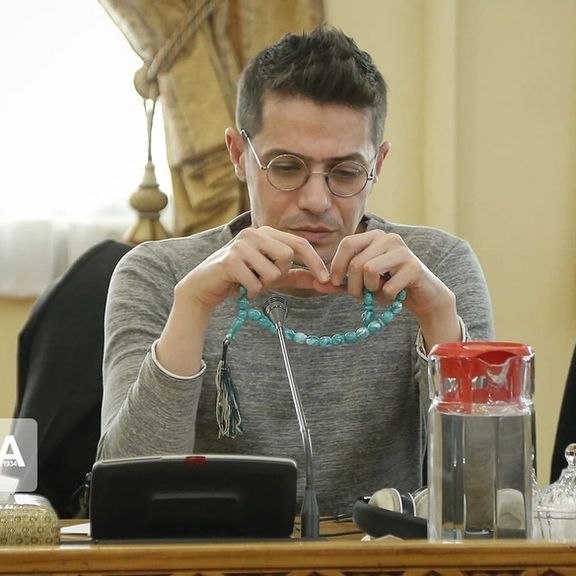
The Islamic Republic has arrested another journalist, bringing the number of detained reporters and photographers over the ongoing protests to well over 70.

The Islamic Republic has arrested another journalist, bringing the number of detained reporters and photographers over the ongoing protests to well over 70.
Mehdi Beyk, the political editor of reformist Etemad newspaper, was arrested on Thursday.
Earlier in the week, the regime’s security forces arrested two other journalists -- Mehdi Ghadimi and Milad Alavi, both working for reformist media outlets.
On Sunday, regime’s agents raided the house of Mehdi Ghadimi’s father in Karaj, west of Tehran, and arrested the journalist who used to work for several dailies in Iran including Etemad and Shargh, both ‘reformist’ publications.
Tehran Journalists Association says at least 73 journalists and photographers have been arrested in the past four months, around the time when 22-year-old Mahsa Zhina Amini was killed in police custody triggering the current wave of antigovernment protests.
Niloufar Hamedi, Elaheh Mohammadi, Nazila Maroufian, the three journalists who broke the news of her death, covered her funeral and interviewed her father were also arrested.
The Brussels-based International Federation of Journalists said in mid-December that at least 57 journalists had been arrested in Iran since September. The international NGO also noted that only 30 of the 57 detained journalists have been reportedly released so far.
There are no exact figures on the number of people arrested during the protests, but some sources say nearly 20,000 people have been detained, more than 500 killed by security forces and many received serious injuries, such as losing their eyes when they were targeted by shotguns.

Sunni worshippers took to the streets for the 14th week in Zahedan after Friday prayers during which the popular cleric Abdolhamid delivered another fiery sermon.
“Whether facing gallows or prison, we will stand firm until the end!” a video posted on twitter shows protesters in Zahedan, capital of the southwestern province of Sistan-Baluchestan, chanting. In another video they are seen chanting “Down with the executioner Republic!”
Two young Baluch protesters, Mansour Dehmardeh and Ebrahim Narouei, were sentenced to death on charges of “corruption on earth” Tuesday. According to the Baluch Activists Campaign (BAC), a rights group, the 22-year-old Dehmardeh who has physical disabilities has also been brutally tortured in detention.
Videos also show protesters chanting against the newly appointed governor of the province. “We don’t want a Daish-i governor!” Brigadier General Mohammad Karami, the former commander of Revolutionary Guards (IRGC) ground forces in the region, was recently appointed as governor in the restive province.
In his sermon this Friday, Mowlavi Abdolhamid protested to the “mass arrests on the streets” in the Sunni-majority province and accused the authorities of torturing detainees until they accept crimes that they never committed. “The Sharia does not sanction forced confessions which the Constitution does not endorse either,” he said while demanding the release of all detainees.
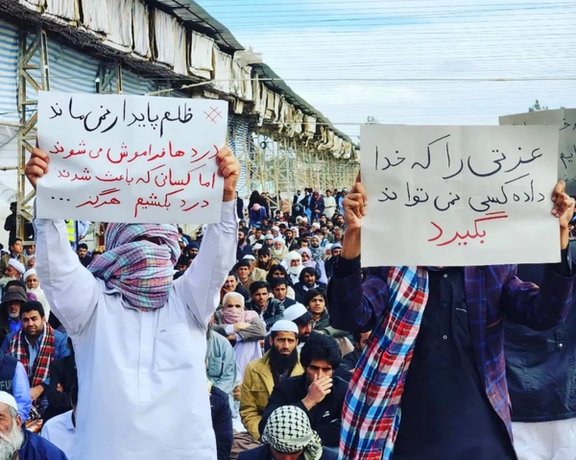
“You have put [protesters] in prison, executed them, and the problem was not solved with these executions, imprisonments and heavy sentencing … Listen to the voice of the people if you want to solve the problems,” he told the authorities.
IRGC-affiliated Fars news website quickly responded to Abdolhamid, publishing remarks by conservative regime insider Javad Larijani, brother of former parliament speaker Ali Larijani, who harshly attacked the Sunni cleric.
“It is about time for the revolutionary forces to set aside niceties with Abdolhamid. He cannot be in Iran and say we are Iranians, but pursue the policies of Iran’s enemies,” Larijani said.
Abdolhamid, officially known as Mowlana Abdolhamid Esmail-Zehi, also noted the anniversary of the Revolutionary Guards downing a Ukrainian commercial flight over Tehran with missiles on January 8, 2020, that killed all 176 onboard. “The government was definitely responsible for this tragedy but did not accept its fault. You weren’t honest with the people,” he said.
“The strength of the system does not ensue from nuclear weapons or military [power]… Strength comes from accepting faults and carrying out justice,” Abdolhamid told the thousands who had gathered at Jameh Mosque of Makki in Zahedan to pray and to take part in the weekly protests that have been held regularly after the Friday prayers since September 30.
The crackdown on protesters on September 30 during which 90-96 Baluch worshippers including children were killed and around 300 were injured has come to be known as the “Bloody Friday of Zahedan”.
Local sources say the IRGC and other security forces set up check points in some areas of Zahedan on Friday to stop the flow of people to the prayers and arrested at least nine youths after the prayers. According to Halvash, a website dedicated to news in the province, the outspoken Abdolhamid has been under pressure from intelligence and security organizations to stop his popular Friday prayers and fiery sermons.
Local sources also say security forces arrested tens of Baluch residents, including teenagers, ahead of this week’s Friday prayers. Some activist groups such as BAC put the number of detainees in the past few days at “hundreds”.
Many of the detainees have been accused of “hooliganism” or connections with foreign countries and “a terrorist group”, presumably the militant Jaish ul-Adl which has a history of deadly operations in the southwestern Sistan and Baluchestan province.
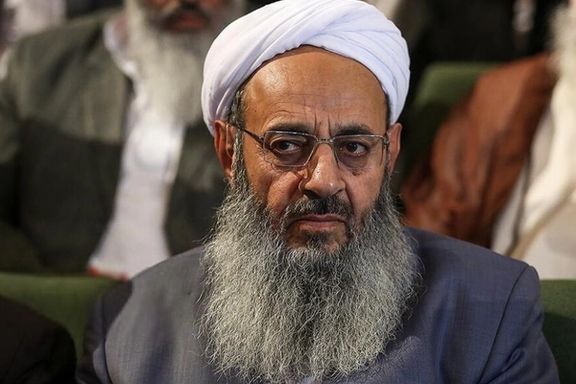
Reports say Sunni religious leader of Zahedan, Mowlavi Abdolhamid, has been under pressure by Iranian security to end his weekly protests and critical sermons on Fridays.
Halvash website that covers Baluchestan events reported Thursday that "Mowlavi Abdolhamid has rejected the requests by the security organizations".
Since September during ongoing protests following the death of 22-year-old Mahsa Amini in police custody, Mowlavi Abdolhamid has made fiery speeches against the heavy crackdown and killing of protesters, calling government actions "felony".
He has also called for holding a referendum in Iran with the presence of international observers.
The Sunni city of Zahedan in the southeastern Sistan-Baluchestan province has been witnessing protests against repressions and discriminations in the province following mass Friday prayers during the past thirteen weeks.
According to Halvash, Thursday evening a large number of military forces and plainclothes agents have been stationed in the schools of Zahedan to repress any protests on Friday January 6.
Meanwhile, other reports say during the past four days, at least 113 Baluch citizens and children have been arrested in different regions of Zahedan by security agencies.
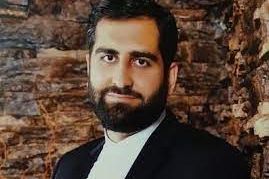
Iran International has learned that Ghasem Fathollahi, an officer of the Revolutionary Guards who was killed in Tehran, was assassinated by the IRGC intelligence.
Fathollahi, a commander of Basij militia unit in one of the neighborhoods of the capital Tehran, was killed Tuesday outside his home after being shot four times by a gunman who fled the scene on a motorcycle. He succumbed to his injuries at a hospital near his place of residence.
He was the commander of the basij base of a mosque in Khani Abad in Tehran, District 12 downtown Tehran.
Initial reports suggested that he was killed by the people opposed the clerical regime, but later sources close to the IRGC claimed that he was killed during a robbery. On Thursday, sources told Iran International that he was shot dead by IRGC intelligence agents due to his leniency towards protesters.
According to our sources, the Intelligence Organization of the IRGC had become suspicious of Fatollahi in the past few weeks and had been monitoring him. The sources said that he refused to confront the demonstrators and suppress them during the protests in the area. The regime uses the Basij paramilitary militia extensively against demonstrators. They are hated by many citizens for acting as mercenaries who are willing to use violence indiscriminately against civilians.
Investigating his conduct, IRGC’s intelligence found out that he was not alone and was in contact with a group of the disgruntled members of security forces who tried to refrain from using deadly violence against protesters, including opening fire at them.
According to Iran International's sources, the Revolutionary Guard Intelligence Organization is worried about the growing number of security forces who refuse to confront the protesters and has taken measures to deal with this trend.
He was apparently using a PlayStation device to keep in touch with a network of protesters. The assailant or someone who reportedly accompanied him took this PlayStation device too.
In the past months, there have been several reports that protesters in different cities have been using private chat rooms available in online games on Sony’s PlayStation network to coordinate street demonstrations. The number of games available on PlayStation is countless, and this issue makes it impossible to track and monitor their conversations.
It is not yet clear whether Fathollahi’s killing was a pre-meditated, deliberate full-fledged hit operation or only a collateral incident during the attempt to seize the PlayStation and arrest him.
Earlier in June, Iran International’s sources said that a commander of IRGC Quds Force unit 840 -- Colonel Ali Esmailzadeh, who died under suspicious circumstances in Karaj on May 30, was an inside job. Esmailzadeh died when he fell from the roof of his home in Jahan Nama area of Karaj.
He was a close colleague of Colonel Hassan Sayyad-Khodaei, the acting commander of the elite Qods Unit 840, who was shot dead behind the wheel of his car outside his home in Tehran on May 22 by two gunmen who fled the scene on a motorbike.

Reports say Sunni religious leader of Zahedan, Mowlavi Abdolhamid, has been under pressure by Iranian security to end his weekly protests and critical sermons on Fridays.
Halvash website that covers Baluchestan events reported Thursday that "Mowlavi Abdolhamid has rejected the requests by the security organizations".
Since September during ongoing protests following the death of 22-year-old Mahsa Amini in police custody, MowlaviAbdolhamid has made fiery speeches against the heavy crackdown and killing of protesters, calling government actions "felony".
He has also called for holding a referendum in Iran with the presence of international observers.
The Sunni city of Zahedan in the southeastern Sistan-Baluchestan province has been witnessing protests against repressions and discriminations in the province following mass Friday prayers during the past thirteen weeks.
According to Halvash, Thursday evening a large number of military forces and plainclothes agents have been stationed in the schools of Zahedan to repress any protests on Friday January 6.
Meanwhile, other reports say during the past four days, at least 113 Baluch citizens and children have been arrested in different regions of Zahedan by security agencies.
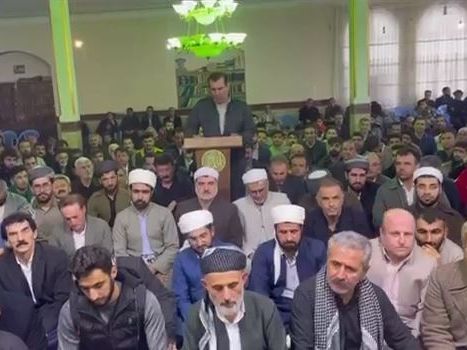
A group of clerics, activists, and other prominent figures in Iran’s Kurdish-majority city of Javanrud have called on the Islamic Republic to end its military siege aimed at ending protests.
In a statement read out in a video message, they urged the regime to end “the economic and military siege" of the city, as well as to stop creating the atmosphere of fear and insecurity.
They also mentioned the situation in the country as evidence of the continuation of the "violent crackdown” on people of the city, calling for ending the repression and releasing people who were arrested during recent protests.
They criticized the regime’s increasing use of military force in the city that has led to widespread anxiety, and crisis in the city.
In addition to Javanrud in western Kermanshah province, they also denounced the military atmosphere of other places, especially cities with Kurdish population in western Iran, and Baluchi population in Sistan-Baluchistan province as well as the city of Semirom in the central Esfahan province.
The military checkpoints at the gates of these cities should be removed so that normal life can be restored for the residents of these cities, they added.
Late in December, security forces attacked the memorial services of some of the protesters that were killed earlier in the city, shooting one more person to death. Since then, clashes have intensified between people and the security forces, most of whom are deployed from other locations to the city of about 50,000 residents. According to local sources, regime agents have stepped up the atmosphere of terror and repression, raiding the homes at night without any court order and arresting people.
Erfan Kakaie, Bahaoddin Veisi, Tahsin Miri, Masoud Teimuri, Jamal Azami, Johar Fatahi and Esmail Gol Anbar were killed by government forces during the bloody protests on November 20 and 21 in Javanrud. The ceremony to mark the fortieth day after their death was supposed to be attended by a large crowd of people last Saturday, December 31. Regime forces fired live rounds and tear gas at the people attending the procession, killing a 22-year-old resident identified as Borhan Eliasi.
Iran's Kurdish cities have been at the forefront of the protests that started with the death in custody of 22-year-old Mahsa Amini from the Kurdish city of Saqqez in mid-September. People in most Kurdish-populated areas in Kordestan, West Azarbaijan and Kermanshah provinces have relentlessly protested and defied government forces since Amini’s death.
The situation is not as tense in other parts of the country, but issuing death sentences as well as long prison terms for detained protesters continues. Pressures on the families of the dead and detained protesters are unrelenting and still there are reports of unexplained deaths of prisoners within a few days after their release.
Meanwhile, following the finalization of the death sentence of Mohammad-Mehdi Karami and Mohammad Hosseini, who are sentenced to death for the alleged murder of a pro-regime Basij member during a protest near Tehran on November 3, the situation at the prison they are being kept in is also tense.
On Wednesday, two members of the Australian House of Representatives -- Keith Wolahan and Aaron Violi -- called on the Islamic Republic to stop issuing death sentences for people arrested in recent protests. They also offered to take political sponsorship for fifteen imprisoned protestors who are facing the death sentence. “Mohammed Mehdi Karami is only 22 years of age and has just been sentenced to death for protesting,” said Wolahan in a letter to the Charge d'affaires of the Islamic Republic in Australia.
Amid increasing pressure on detained protestors, the wave of hunger strikes in prisons is on the rise with the detainees’ health in danger. Armita Abbasi, and over a dozen other female prisoners in Kachouie prison of Karaj, west of Tehran, have gone on hunger strike since Monday to protest their indefinite detention, lack of access to lawyers and the danger of harsh verdicts.